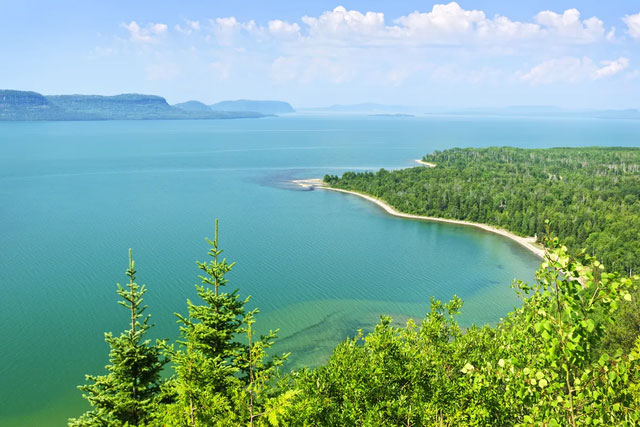Why doesn't the water in the lake completely seep into the ground?
Soil has a high ability to absorb water, so why doesn't all the water in large lakes soak into the ground ?
The first important thing to confirm is that there is definitely a certain amount of water in the lakes that has seeped into the ground. People often do not pay attention because the amount of water lost will quickly be replenished thanks to the rain. Normally, lake water will not be absorbed by the soil at a rapid rate. It was as if there was a magical shield in the middle that helped keep the water in, forming large lakes that could last hundreds of years.
The strange thing here is not as difficult to explain as we think. Imagine someone puts a stone on the ground and sprinkles some water on it. Water will not flow through to the other side of the slab. Instead, it will overflow.

When water and soil are separated by a layer of rock, the soil's water absorption process will not take place.
A similar mechanism also occurs in lakes with rock-accumulated bottom layers . If the bottom of the lake has a lot of rocks, there will be very little space in between for water to pass through. When water and soil are separated by a layer of rock, the soil's water absorption process will not take place.
Even in cases where there are gaps, lakes often accumulate a lot of sediment such as sand, silt and clay, which helps fill those gaps. Over a long period of time, the pond bottom evolves and changes on its own. The materials settle and small particles or sediment fill the large voids.
However, water can also escape the lake in other ways - specifically, evaporation . Finally, the higher possibility of water loss will come from the sky, not from the ground. But thanks to a biochemical phenomenon called the water cycle, water lost through evaporation can theoretically be replenished with rainfall.
That's the theory, but a study published in May 2023 showed that more than half of the world's large lakes (including both natural and artificial lakes) are drying up. According to the researchers, 56% of that decline is due to human consumption and climate warming, which increases the amount of water lost through evaporation.
Therefore, even though lakes do not soak into the ground for a long time, the risk of loss due to evaporation is also an issue that people should keep an eye on.
- Why does the lake water not evaporate or soak into the ground?
- Special pink lakes
- The 200m-wide lake disappeared without a trace after a night
- Detect pure lake water near distilled water
- Unique architecture of the semi-submersible palace floating on the lake
- Hydrosphere - The cradle of life
- The Dead Sea is likely to disappear completely
- Only standing water areas can be deadly
- Signs of life in the Antarctic underground lake
- Sacred lake in China: 800,000 tons of shrimp and fish but no one dares to catch it
- Poopó Lake 1000km2 wide suddenly disappeared
- 12 seas, the lake has the most water in the planet
 'Fine laughs' - Scary and painful torture in ancient times
'Fine laughs' - Scary and painful torture in ancient times The sequence of numbers 142857 of the Egyptian pyramids is known as the strangest number in the world - Why?
The sequence of numbers 142857 of the Egyptian pyramids is known as the strangest number in the world - Why? History of the iron
History of the iron What is alum?
What is alum?